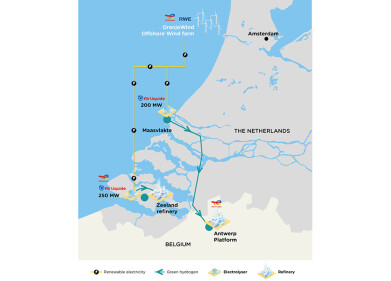Green energy
University of Brighton researchers collaborate on groundbreaking hydrogen-powered crematorium project
Jun 30 2023
A team of researchers from the University of Brighton is actively involved in a pioneering initiative to develop the world's first hydrogen-powered crematorium. This groundbreaking project, funded by the Department for Energy Security and Net Zero, is centred around Worthing Crematorium in West Sussex and aligns with Adur & Worthing Council's commitment to achieving carbon neutrality by 2030.
DFW Europe, a leading cremator manufacturer, will commence testing the innovative hydrogen technology at its facility in the Netherlands this summer. Upon successful trials, the technology will be implemented at Worthing Crematorium as early as spring 2024.
Dr. Kevin Wyche, Pete Lyons, and Dr. Kirsty Smallbone from the University of Brighton's School of Applied Sciences are responsible for conducting air quality monitoring as part of the project. Their aim is to demonstrate that the proposed hydrogen-powered system can significantly reduce carbon emissions without compromising air quality.
Currently, cremation is an energy-intensive process heavily reliant on natural gas, making the crematorium the largest emitter of carbon within the Adur & Worthing Council's operations. The proposed solution involves utilising green hydrogen, generated from renewable energy sources. Unlike natural gas, hydrogen combustion does not produce CO2 emissions, and the production of green hydrogen itself is carbon-free.
Dr. Kirsty Smallbone emphasised the importance of achieving net-zero emissions to mitigate climate change's impact on the environment. The transition away from fossil fuels and toward hydrogen will play a pivotal role in this endeavour, as hydrogen can decarbonise various aspects of our lives, including end-of-life practices.
Cllr Sophie Cox, Worthing's Cabinet Member for Climate Emergency, expressed gratitude to the dedicated individuals who have worked tirelessly to bring this global first to fruition. The project represents an innovative stride towards the council's goal of achieving net-zero emissions by 2030. Additionally, the council acknowledges the Net Zero Innovation Portfolio for providing funding to support their environmentally conscious objectives.
The crematorium's carbon emissions rank high within the council's estate, making this trial a significant step towards establishing the council as a net-zero authority.
The University of Brighton, as a key partner in the Hydrogen Sussex project, is actively involved in conducting groundbreaking research to support the development of a low-carbon hydrogen economy. These efforts are instrumental in propelling the region closer to achieving net-zero emissions.
In addition to the hydrogen-powered crematorium project, the University is also supporting other hydrogen-based initiatives. One such pilot project aims to create the world's first clay bricks entirely powered by green hydrogen energy, eliminating the need for natural gas. Collaborating with Michelmersh, a Haywards Heath-based company, the initiative seeks to drastically reduce carbon emissions from an industry that contributes over one million tonnes of carbon annually in the UK alone.
Events
Apr 08 2025 Targi Kielce, Poland
Apr 08 2025 Bahrain
Apr 10 2025 Beijing, China
Apr 10 2025 Beijing, China
Apr 15 2025 Moscow, Russia














